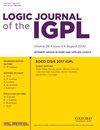膜连接
IF 0.8
4区 数学
Q2 LOGIC
引用次数: 0
摘要
让 $\varSigma $ 是一个没有 $0$ary 运算符号的签名,$\textsf{Sl}$ 是半格的范畴。然后,在定义并研究了所有半网格上 $\varSigma $ 算法的归纳系统的类别 $int ^{textsf{Sl}}\textrm{Isys}_{\varSigma }$之后,这些类别是有序对 $\mathscr{A}= (\textbf{I}、\其中 $\textbf{I}$ 是一个半网格,而 $\mathscr{A}$ 是相对于 $\textbf{I}$ 的 $\varSigma $-gebras 的归纳系统,以及 PłAlg$ (\varSigma )$、的 Płonka $\varSigma $-代数,它们是有序的一对 $(\textbf{A},D)$,其中 $\textbf{A}$ 是一个 $\varSigma $-代数,而 $D$ 是 $\textbf{A}$ 的 Płonka 算子,即即用传统术语来说,$\textbf{A}$ 的分割函数,我们证明了本文的主要结果:存在一个从 $int ^{\textsf{Sl}}\textrm{Isys}_{\varSigma }$ 到 PłAlg$ (\varSigma )$ 的邻接,我们称之为 Płonka 邻接。本文章由计算机程序翻译,如有差异,请以英文原文为准。
Płonka adjunction
Let $\varSigma $ be a signature without $0$-ary operation symbols and $\textsf{Sl}$ the category of semilattices. Then, after defining and investigating the categories $\int ^{\textsf{Sl}}\textrm{Isys}_{\varSigma }$, of inductive systems of $\varSigma $-algebras over all semilattices, which are ordered pairs $\mathscr{A}= (\textbf{I},\mathscr{A})$ where $\textbf{I}$ is a semilattice and $\mathscr{A}$ an inductive system of $\varSigma $-algebras relative to $\textbf{I}$, and PłAlg$ (\varSigma )$, of Płonka $\varSigma $-algebras, which are ordered pairs $(\textbf{A},D)$ where $\textbf{A}$ is a $\varSigma $-algebra and $D$ a Płonka operator for $\textbf{A}$, i.e. in the traditional terminology, a partition function for $\textbf{A}$, we prove the main result of the paper: There exists an adjunction, which we call the Płonka adjunction, from $\int ^{\textsf{Sl}}\textrm{Isys}_{\varSigma }$ to PłAlg$ (\varSigma )$.
求助全文
通过发布文献求助,成功后即可免费获取论文全文。
去求助
来源期刊
CiteScore
2.60
自引率
10.00%
发文量
76
审稿时长
6-12 weeks
期刊介绍:
Logic Journal of the IGPL publishes papers in all areas of pure and applied logic, including pure logical systems, proof theory, model theory, recursion theory, type theory, nonclassical logics, nonmonotonic logic, numerical and uncertainty reasoning, logic and AI, foundations of logic programming, logic and computation, logic and language, and logic engineering.
Logic Journal of the IGPL is published under licence from Professor Dov Gabbay as owner of the journal.

 求助内容:
求助内容: 应助结果提醒方式:
应助结果提醒方式:


